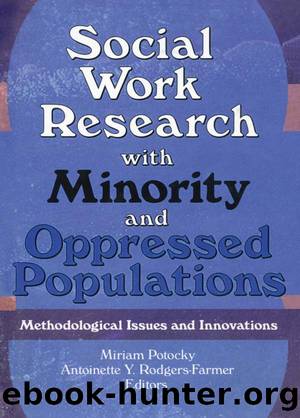Social Work Research with Minority and Oppressed Populations by Miriam Potocky Antoinette Y Rodgers Farmer

Author:Miriam Potocky, Antoinette Y Rodgers Farmer [Miriam Potocky, Antoinette Y Rodgers Farmer]
Language: eng
Format: epub
Tags: Social Science, General, Ethnic Studies, Sociology
ISBN: 9781317948698
Google: rkLKAgAAQBAJ
Publisher: Routledge
Published: 2014-02-04T04:06:17+00:00
RECOMMENDATIONS
As the foregoing discussion suggests, the lack of agreement about and specification of the expression of depressive symptoms across different ethnic minority women require social work researchers to cautiously assess the utility of strategies, including the use of standardized instruments, to measure this complex and elusive construct. As noted, there is considerable variability among American ethnic minorities, especially among women of color, in the factor structures of depression measures normed on mainstream Caucasian populations. Current critics attribute many of these differences to language and instrument biases, which are influenced by difficulties encountered in the translation process (e.g., Callahan & Wolinsky, 1994; Marin & Marin, 1993). As noted, measures may be semantically or linguistically equivalent, but still fail to capture the construct of interest as this is uniquely expressed in a particular cultural group.
We agree with Kleinman (1987, p. 453) who encourages researchers to exercise âhumility in the face of alternative cultural formulations of human problemsâ and to feel âuncomfortable with our taken-for-granted professional categories â¦â To this we would add the importance of constant introspection or self-reflection by researchers about how discrepancies in power, status and influence between themselves and âthe researchedâ can promote distorted communication and false conclusions (Uehara et al., 1996). Along with these general admonitions to applied social scientists, we offer several recommendations that could promote more culturally-sensitive and culturally-valid methods in social work research with women of color who experience âdepressionâ in multiple ways. Specifically, we offer suggestions for promoting methodological diversity, enhancing the cross-cultural equivalence of self-report measures, expanding assessment to consider environmental risk and resiliency factors, attending to the interpersonal processes of data collection, and engaging in researcher self-assessment.
Methodological diversity. One overarching recommendation offered by cross-cultural researchers is methodological diversityâthe utilization of multiple research methodologies simultaneously or in coordinated sequelae that subsequently link and integrate qualitative and quantitative procedures (Ponterotto & Casas, 1991). Various methodologic combinations can be achieved by incorporating different sources of and procedures for collecting data, in multiple contexts (Jenkins, Kleinman, & Good, 1991). Multiple methods and multisource strategies allow researchers to critically assess for triangulation or congruency in meaning among various sources of information. When information from different venues appears congruent, confidence in the validity of study findings is enhanced.
Social work researchers can achieve multimethod and multisource measures in studies with culturally-diverse groups by: (1) sampling various response modes, including indicators of somatic, interpersonal-familial, and psycho-emotional-spiritual distress; (2) employing a mix of standardized instruments, client- or population-specific questions or scales with options for open-ended answers, self-monitoring or diary formats, individual and group interviews, and field or in-vivo observations; (3) representing the viewpoints of respondents themselves in addition to those of relevant figures or key informants in the respondent's family or community; and (4) gathering information from different contexts or situations in which respondents typically function.
Cross-cultural equivalency. When selecting or developing measures for research with people who represent ethnic/cultural minority groups, social work scholars would likely benefit from reviewing relevant cross-cultural literature in other disciplines, and from ongoing consultation with bilingual and bicultural experts in the communities of interest.
Download
This site does not store any files on its server. We only index and link to content provided by other sites. Please contact the content providers to delete copyright contents if any and email us, we'll remove relevant links or contents immediately.
The Hot Zone by Richard Preston(2013)
Rigor Mortis by Richard Harris(1712)
How Innovation Works by Matt Ridley(1643)
Oxymoronica by Dr. Mardy Grothe(1560)
Mawson's Will by Lennard Bickel(1455)
Kathryn Bowers & Barbara Natterson-Horowitz by Zoobiquity(1420)
THE DEMON HAUNTED WORLD by Carl Sagan(1356)
The Future of the Mind: The Scientific Quest to Understand, Enhance, and Empower the Mind by Michio Kaku(1348)
Bankrupting Physics by Alexander Unzicker(1323)
The End of Breast Cancer by Kathleen T. Ruddy MD(1303)
Statistics Done Wrong: The Woefully Complete Guide by Alex Reinhart(1300)
The Ghost Hunters by Deborah Blum(1282)
One Two Three ... Infinity: Facts and Speculations of Science by George Gamow(1251)
Science Book by Big Ideas Simply Explained(1230)
The Universe Speaks in Numbers by Graham Farmelo(1227)
The Wizards of Langley by Jeffrey T Richelson(1140)
Biomimicry by Janine M. Benyus(1111)
Rigor Mortis: How Sloppy Science Creates Worthless Cures, Crushes Hope, and Wastes Billions by Richard Harris(1088)
The Case Against Fragrance by Kate Grenville(1057)
